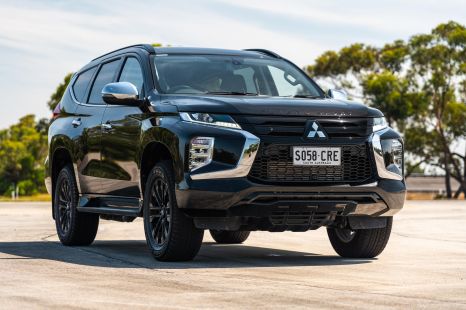

Josh Nevett
Mitsubishi Pajero Sport deals: Free tow pack offer extended
1 Year Ago
View 94 images
New from
$44,940 excl. on-roads
Review Rating
Good
Safety Rating
NA
Warranty
10 year, 200,000 km
Fuel Efficiency
8 / 100km
The Mitsubishi Pajero Sport receives some new colours and minor specification updates for 2023, as well as slight price increases.
All 2023 models are between $500 and $1000 more expensive than before, though tyre pressure monitoring has become standard fit on GLS, Exceed and GSR models.
The updated range enters production in February 2023, with dealership arrivals set for April.
Impulse Blue joins the colour palette for GLS and Exceed variants, while the flagship GSR gains a Terra Rossa exterior finish paired with a black roof.
Otherwise, the Pajero Sport is unchanged. As it’s based on the current Triton and a next-generation ute has been spied testing, the Pajero Sport is likely towards the end of its life cycle.
Quickly see how this car stacks up against its competition. Select any benchmark to see more details.
Where expert car reviews meet expert car buying – CarExpert gives you trusted advice, personalised service and real savings on your next new car.
| Configuration | Price From* |
|---|---|
| 2.4L, 8-speed auto, 5-door SUV, Diesel, RWD | $44,440 |
| 2.4L, 8-speed auto, 5-door SUV, Diesel, 4x4 | $49,440 |
| 2.4L, 8-speed auto, 5-door SUV, Diesel, 4x4 | $49,940 |
| 2.4L, 8-speed auto, 5-door SUV, Diesel, RWD | $44,940 |
| Configuration | Price From* |
|---|---|
| 2.4L, 8-speed auto, 5-door SUV, Diesel, RWD | $49,190 |
| 2.4L, 8-speed auto, 5-door SUV, Diesel, 4x4 | $54,190 |
| 2.4L, 8-speed auto, 5-door SUV, Diesel, 4x4 | $55,190 |
| 2.4L, 8-speed auto, 5-door SUV, Diesel, RWD | $50,190 |
| Configuration | Price From* |
|---|---|
| 2.4L, 8-speed auto, 5-door SUV, Diesel, 4x4 | $59,690 |
| 2.4L, 8-speed auto, 5-door SUV, Diesel, 4x4 | $60,690 |
| Configuration | Price From* |
|---|---|
| 2.4L, 8-speed auto, 5-door SUV, Diesel, 4x4 | $61,440 |
| 2.4L, 8-speed auto, 5-door SUV, Diesel, 4x4 | $62,440 |
Where expert car reviews meet expert car buying – CarExpert gives you trusted advice, personalised service and real savings on your next new car.
See our comprehensive details for the Mitsubishi Pajero Sport
The Pajero Sport’s luggage space with the seats all in place is 131L in seven-seat models and 502L in the base GLX, increasing to 1575L with all rear seats folded.
Where expert car reviews meet expert car buying – CarExpert gives you trusted advice, personalised service and real savings on your next new car.
CarExpert High Resolution Photos of the Mitsubishi Pajero Sport

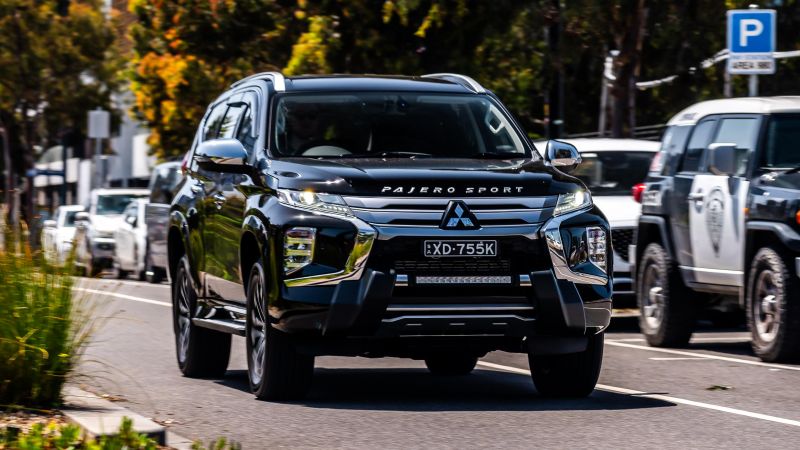
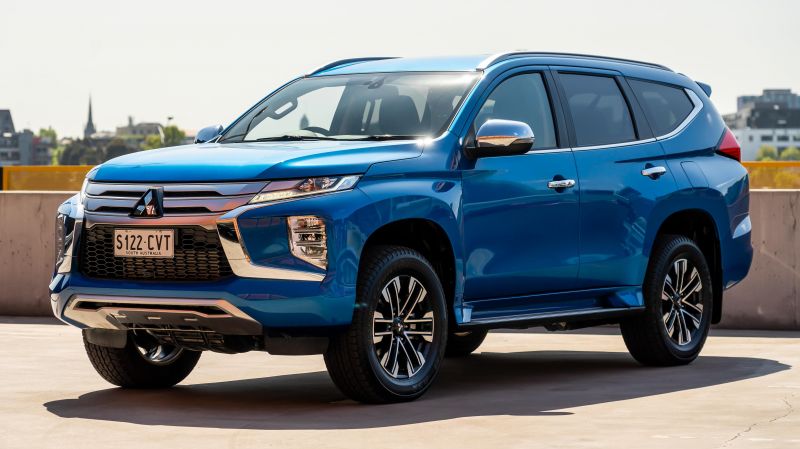
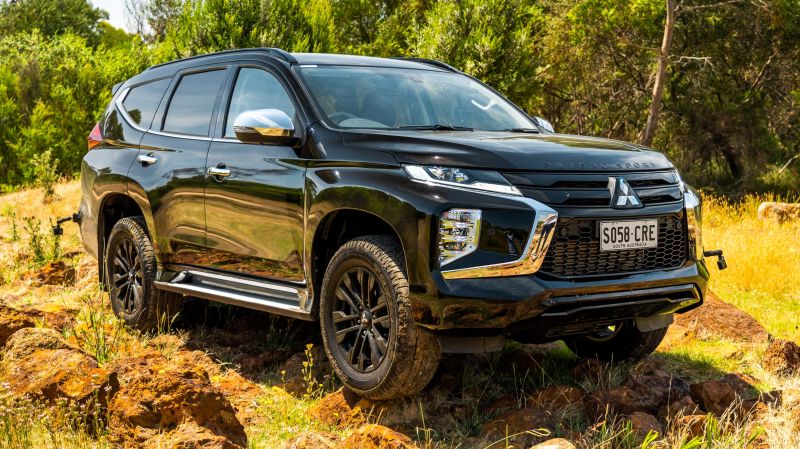
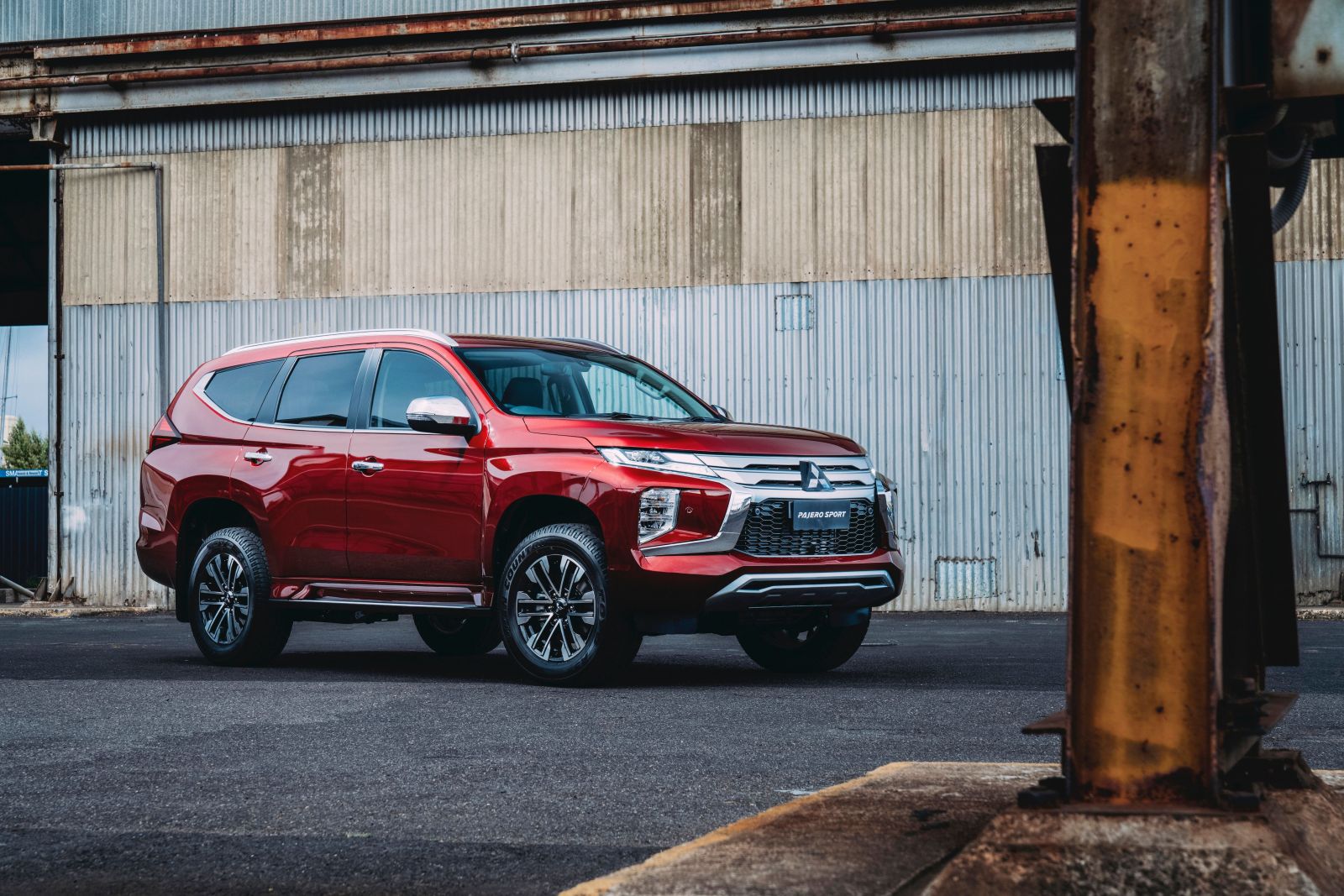
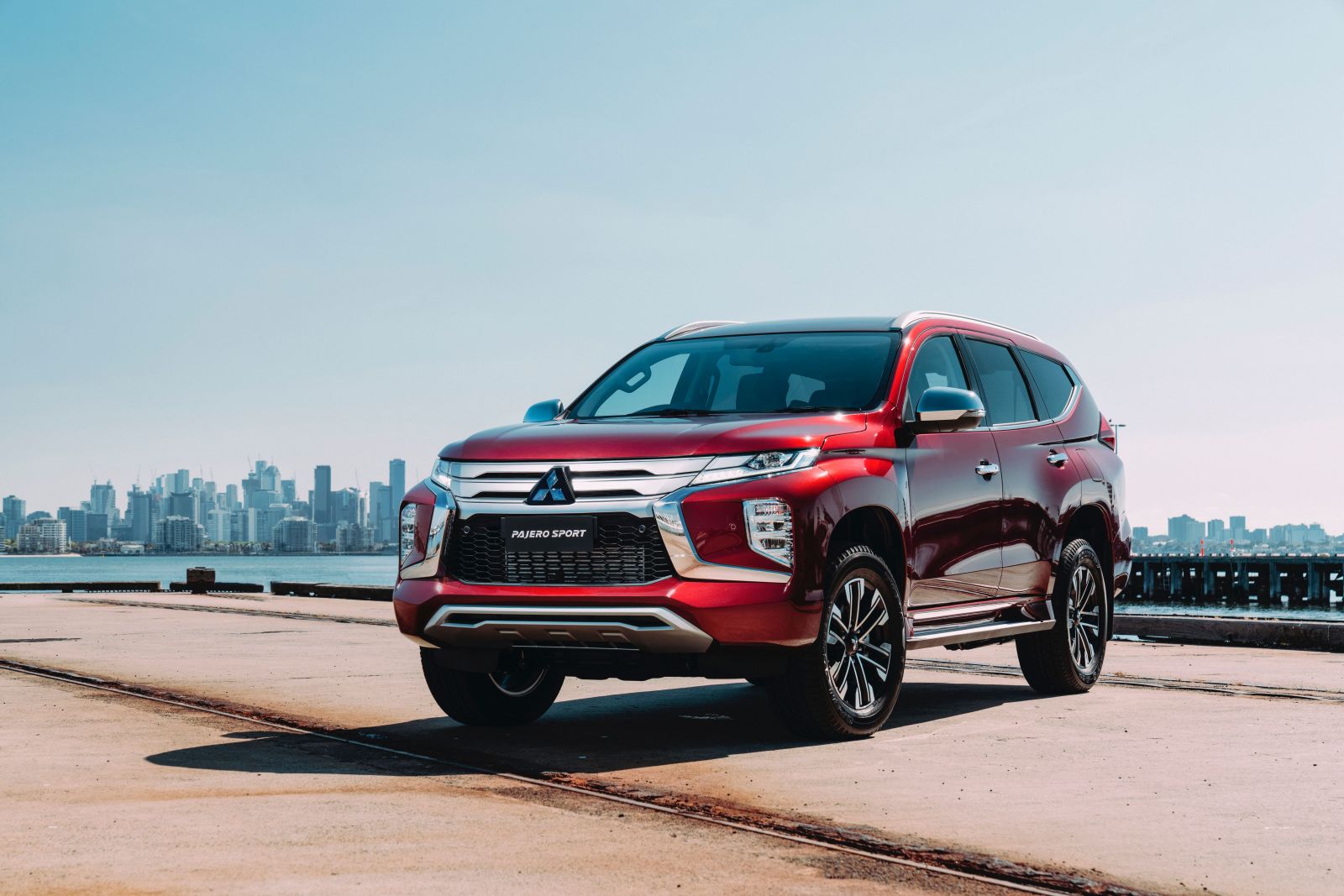
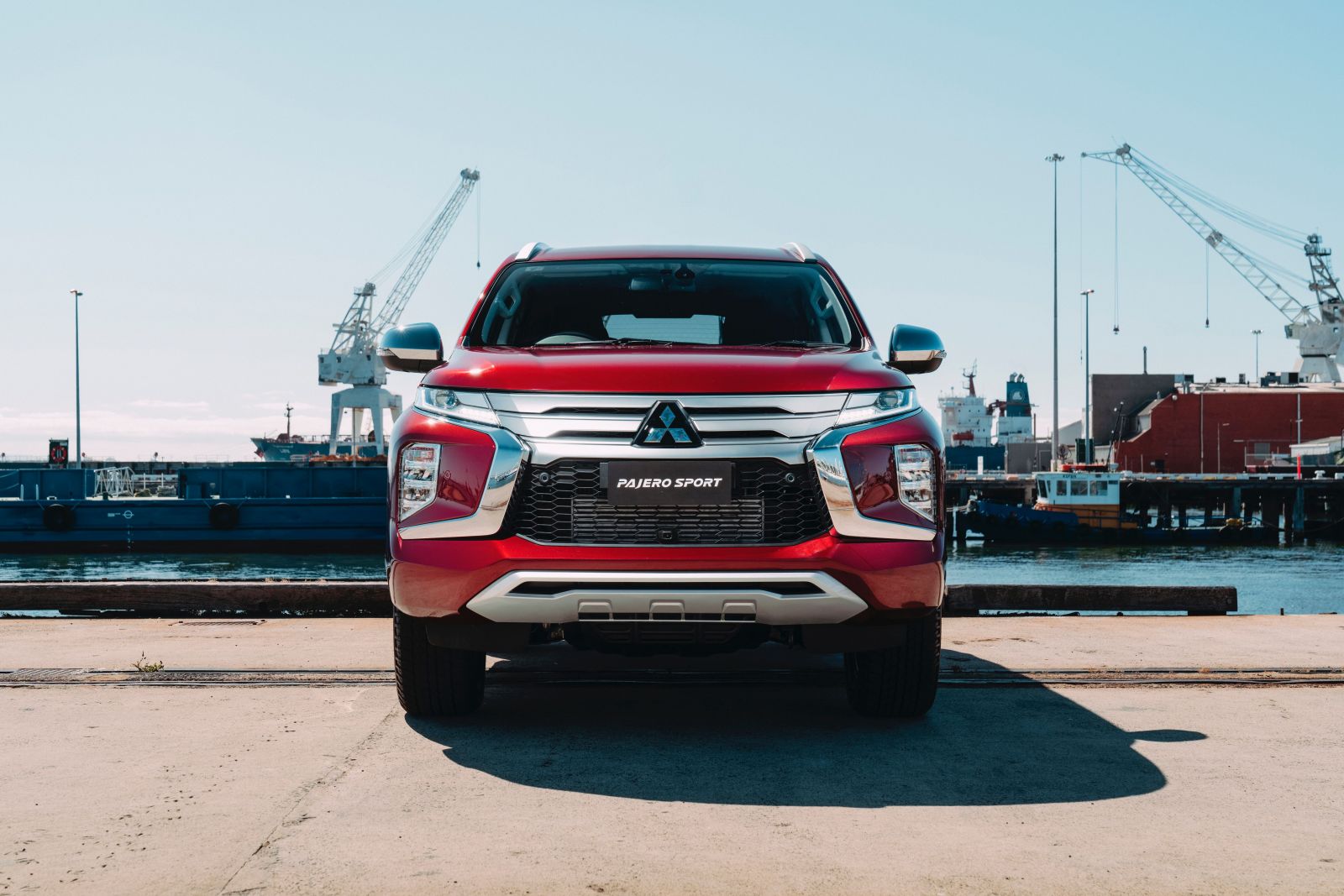

View 50 images
The Mitsubishi Pajero Sport received a mid-life update in 2019 that brought a refreshed front fascia and reworked tail lights, among other changes.
Mitsubishi has tried its best to disguise the ute-based underpinnings with its Pajero Sport but they are still evident from some angles.
Regardless of the facelift, the Pajero Sport's styling is seen as polarising.
There are LED headlights that are standard across the range, including LED daytime running lights and fog lights.
One sticking point for people seems to be the tall taillights. The overly vertical tail lights aren’t the best stylistic choice for a ute-based SUV as they accentuate its tall, narrow appearance.
Like an Everest or Fortuner, the Pajero Sport would look vastly better with a wider body and track but, alas, that’s not in the cards.
New for the 2022 model year, the top-of-the-range GSR receives an exterior black pack. There's black-finish 18-inch alloy wheels, as well as a black roof, bumper and headlights garnishes, rear spoiler and grille.
The build quality is good, and the materials such as the dash trims and seat leather are hard-wearing without feeling cheap and nasty. There are some padded touch-points and contrasting silvery trims and stitching that enliven things nicely.
The steering wheel is nicely trimmed, with easy-to-learn button controls and massive, quality paddle shifters (4x4 models only) situated behind.
The most impressive change from the Triton is the 8.0-inch digital instrument cluster, available only on the Exceed. The Pajero Sport GLX and GLS use a carryover instrument cluster from the Triton.
There’s one annoying quirk you’ll notice up front, however: the indicators. Well, perhaps you mightn’t have noticed before but now you will.
The noise they make is irritating, and they sound like a metronome.
The 8.0-inch touchscreen infotainment system features Android Auto, Apple CarPlay and satellite navigation.
Unfortunately, it’s the same dated navigation system found in other Mitsubishi products.
That means the map is always massively zoomed out when you open the app and doesn’t automatically rotate in the correct direction as Google Maps or many factory navigation units will.
The maps also have poor contrast at night – everything is grey on grey.
The front seats are plush yet supportive and remain comfortable over long distances. Likewise the second row, where there’s also plenty of legroom.
The Pajero Sport’s ute origins are evident as the cabin is narrower than a typical crossover at this price point.
The third row is the most disappointing part of the Pajero Sport’s interior.
To get back there, you need to pull the lever on either side of the second-row seats. They then fold 60:40 up against the front row seatbacks.
Next, you need to awkwardly clamber back into the third row. There’s no graceful way to do this.
For such a boxy, upright SUV, you’d expect third row headroom to be pretty good.
The Pajero Sport is a tight squeeze in terms of both third row legroom and headroom for adults – the seats are clearly designed for use by smaller passengers, and feel dinky.
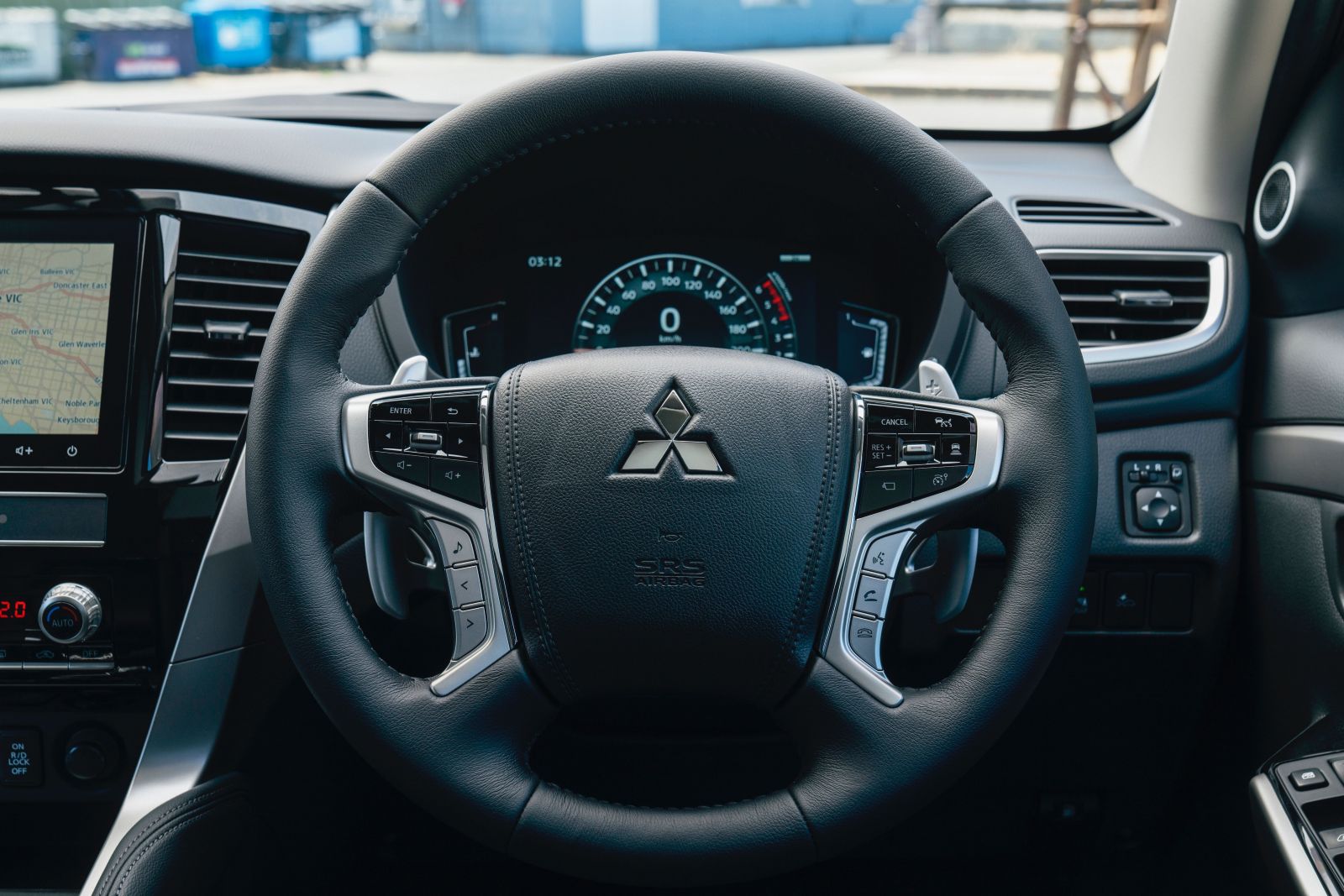
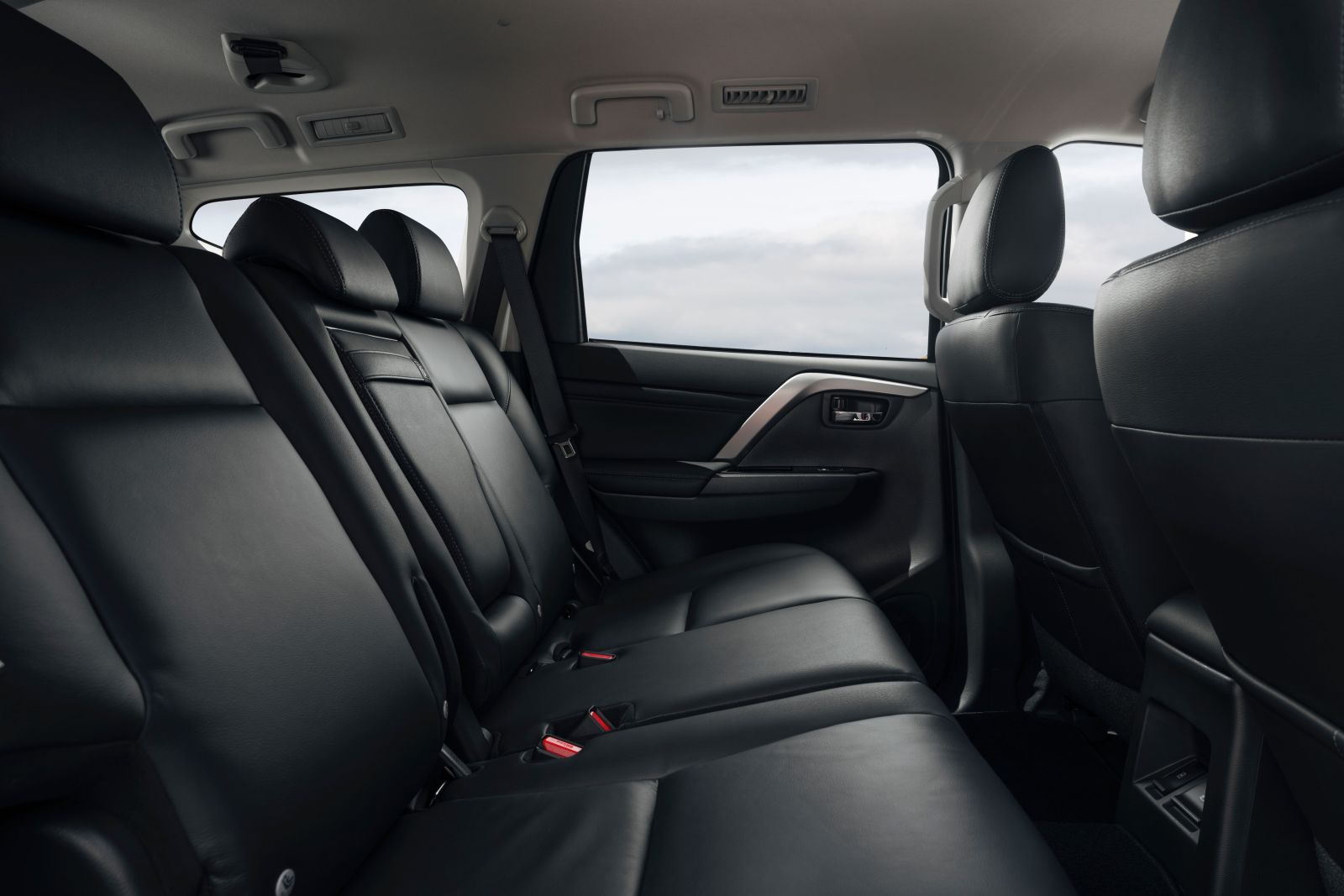
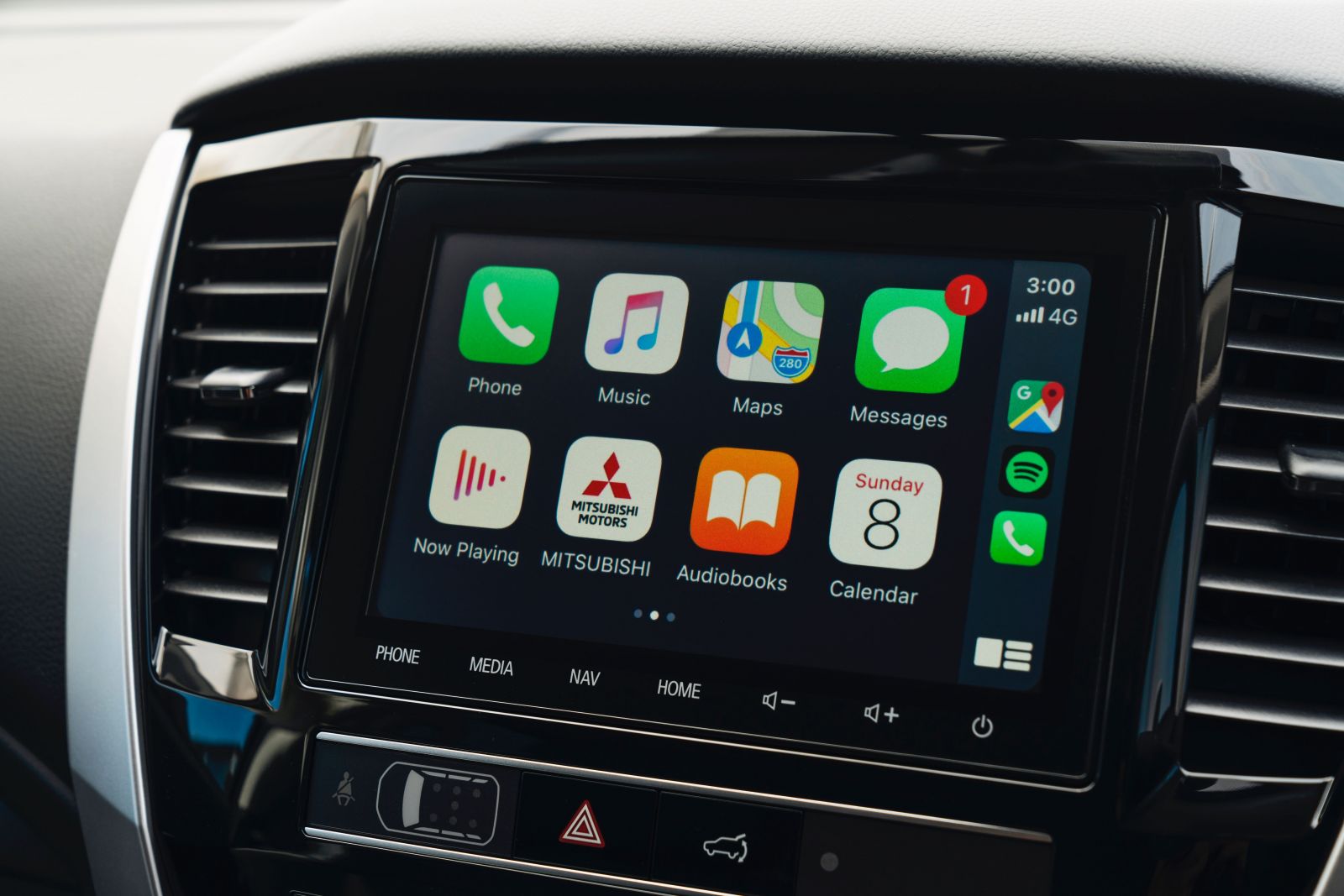
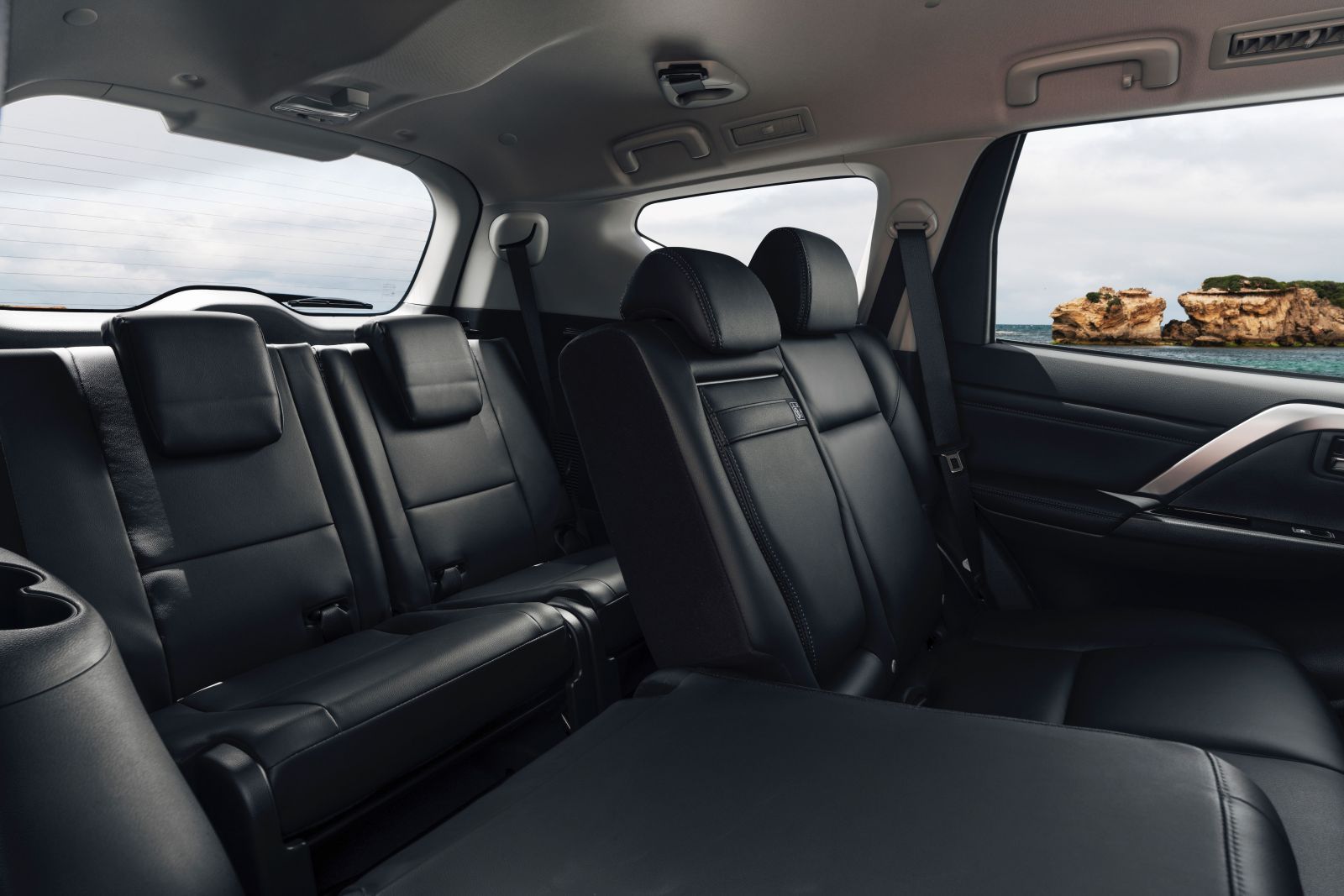
View 4 images
All models come with an 8.0-inch touchscreen infotainment system that supports wired Apple CarPlay and Android Auto - missing out on wireless capabilities.
Stepping up to the higher spec Exceed and GSR will also see you get an 8.0-inch instrument cluster display.
The Mitsubishi Pajero Sport has a five-star rating from ANCAP with a 2015 date-stamp, with the rating based on that of the mechanically related Triton ute.
This rating was based on a frontal offset score of 15.22 out of 16 and a side impact score of 16 out of 16. Whiplash and pedestrian protection were rated Good and Acceptable, respectively.
All 2022 Mitsubishi Pajero Sport models come standard with the following safety features:
Blind-spot monitoring, a surround-view camera and rear cross-traffic alert are standard in the Pajero Sport Exceed and GSR.
All 2022 Mitsubishi Pajero Sport models use 8.0L/100km on the ADR combined city and highway cycle and have a 68L fuel tank.
| Mitsubishi Pajero Sport | Fuel Type | Combined |
|---|---|---|
| 2.4L, 8-speed auto, 5-door SUV, Diesel, RWD | Diesel | 8.0 L/100km |
| 2.4L, 8-speed auto, 5-door SUV, Diesel, 4x4 | Diesel | 8.0 L/100km |
What are the running and servicing costs of a Mitsubishi Pajero Sport?
Mitsubishi hasn’t announced any changes to service pricing for 2023. The following prices currently apply to MY20, MY21 and MY22 Pajero Sports.
Our expert take on Mitsubishi Pajero Sport drivability.
All 2023 Mitsubishi Pajero Sport models use a 2.4-litre turbo-diesel four-cylinder engine producing 133kW of power and 430Nm of torque, mated to an eight-speed automatic transmission.
Mitsubishi’s Super-Select II four-wheel drive system features a full-time four-wheel drive mode as well as selectable low- and high-range gearing and a locking rear differential.
The GLX and GLS are offered with a choice of rear- or four-wheel drive.
Though it shares its underpinnings with the Triton, the Pajero Sport does a credible job in concealing its ute origins.
Take, for example, the ride quality. It’s vastly superior to the Triton, banishing the jiggly, unsettled feeling of the Triton.
Much of the credit goes to the three-link, coil-spring rear suspension, replacing the leaf springs of the Triton.
There’s still some impact harshness over sharp ruts but it’s fairly compliant for an SUV with a live rear axle.
Noise suppression is also far superior to the Triton, particularly on the highway. Where the Triton’s engine clatters, the Pajero Sport’s is hushed.
There’s the typical turbo-diesel soundtrack as you punch it from a stop but it never crosses the line into becoming raucous.
It doesn’t cross the line into becoming particularly fast, either, but there’s adequate power to motivate this large SUV. The eight-speed automatic transmission also feels well-matched to the turbo-diesel four.
To drive the Pajero Sport, however, is to understand there are still compromises being made.
While it feels dramatically improved over a Triton, it’s no match for a Hyundai Santa Fe dynamically.
The car-based crossover will run rings around the big Mitsubishi.
While the Pajero Sport isn’t a match for crossovers on the road, it can go farther off road.
Perhaps the most notable feature of the Pajero Sport is the Super-Select II 4×4 system in four-wheel drive models.
The default 2H is rear-wheel drive, and there’s the usual 4-High mode with locked centre diff to fix front-to-rear torque flow, and 4-Low that activates the transfer case. But there’s also a 4H permanent AWD setting with open diff that can be used on normal roads, particularly when wet, snowy or gravelly, without you having to fret over transmission wind-up like older-school part-time setups.
There’s an additional rear diff lock to apportion rear-axle torque effectively to stave-off free-wheeling when the surfaces are super uneven, and various surface-specific switchable modes that adjust the throttle take-up and stability control lassitude.
Mitsubishi cites a maximum braked-trailer tow rating of 3.1 tonnes (for 4x4 models), but we’d err on the side of caution with that figure. For a caravan, boat, or 2.2-tonne horse float it’ll do the trick.
There’s a trailer stability assist function built into the stability control, which does a good job stabilising you in crosswinds or over uneven surfaces. You’d be doing well to get turned inside-out or jackknife. Grab a brake controller and tow kit and you’re set for the family getaways.
What colours are available for the Mitsubishi Pajero Sport
White is the standard colour, with all other shades costing $740 with the exception of White Diamond, a $940 option.
The optional shades are:
The GSR is available only in White Diamond or Black Mica, while the base GLX isn’t available in White Diamond, Black Mica or Dark Blue.
The 2023 Mitsubishi Pajero Sport requires servicing every 12 months or 15,000km, whichever comes first.
Mitsubishi’s standard warranty covers five years or 100,000km, but so long as you return to one of its dealerships at each service this extends to 10 years or 200,000km.
Servicing at dealerships also lets you take advantage of Mitsubishi’s 10 years of capped-price servicing.
Is this the right car for you? Out experts buy or not guide.
The Pajero Sport may be based on the Triton ute but this isn’t simply a ute with a shell on the back.
Mitsubishi has comprehensively refined the Pajero Sport’s on-road behaviour.
You will, however, feel a difference between this and a car-based crossover SUV like a Santa Fe. Quite simply, you need to evaluate whether you actually need the superior towing and off-road capability the Pajero Sport provides.
If you’re never going to bother taking your SUV off the road, the Pajero Sport isn’t the ideal SUV for you due to its rather cumbersome handling.
It’s also let down by a third row that simply isn’t as comfortable as one might expect from an SUV this size.
The handsome interior could also do with some upgraded materials to truly differentiate it from the Triton.
Nevertheless, if you plan on doing a healthy mix of both on-road and off-road driving, the Pajero Sport represents terrific value.
Where expert car reviews meet expert car buying – CarExpert gives you trusted advice, personalised service and real savings on your next new car.
The cheapest Mitsubishi Pajero Sport is the GLX that starts from $44,440.
The most expensive Mitsubishi Pajero Sport is the GSR that starts from $62,440.
The best towing capacity of a Mitsubishi Pajero Sport is 3100 kg offered by the following variants: GLX, GLS, Exceed and GSR.
The largest Mitsubishi Pajero Sport is the GLX which measures 1815mm wide, 4825mm in length and sits 1835mm tall.
The most powerful Mitsubishi Pajero Sport is the GLX which has 133kW of power from its 2.4L TURBO engine.
The Mitsubishi Pajero Sport is built in Thailand and shipped to Australia.
The heaviest Mitsubishi Pajero Sport is the GLX which weighs 2775 kg (kerb weight).
The Mitsubishi Pajero Sport uses diesel.